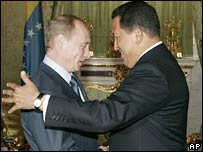Throwing down the gauntlet...

Alright, Katy - if that is
indeed your real name - things have gone far enough. I shall suffer your Guacharophobia in silence no more.
The time has come for an Opinion Duel.
Please comment responsibly:
|
Er Conde en Er Guachinton Pos
The
Guachinton Pos picks up an AP story about Rausseo...
"He's ugly, I'm ugly ... I talk, he talks. But the difference is I live in Venezuela," he quipped, in a gibe at the frequent overseas travels of the Venezuelan 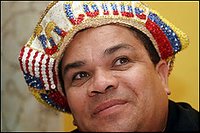 leader, who has been on a three- continent tour since last week.
leader, who has been on a three- continent tour since last week.
Rausseo, who is also a successful businessman with hotels and other enterprises, grew up poor and left school at 11 to support his family as a shoeshine boy, street vendor and taxi driver.
On Friday he told supporters that even if he cracks jokes on the campaign trail, he's serious about combatting crime, creating jobs, winning the trust of foreign investors and healing a divided nation.
Please comment responsibly:
|
The Sancocho Test
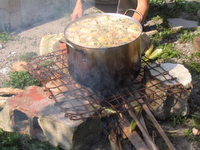
Ask yourself this: what drives people's voting in the TV age? Is it experience? "Preparation"? A government program? Ideology?
It's none of these things: in a media-saturated age, voting is driven by
primal identification.A generation ago, before media saturation had reached the extreme levels we see these days, voting was mediated by formal party structures built on long-standing allegiances. An adeco was an adeco
hasta que se muera. Party identifications were passed down within the family from one generation to the next.
The rise of ubiquitous media, and the collapse of party affiliations, has dissolved these easy certainties. Today, the mediating structure between candidate and voter is no longer the political party, it's the TV camera. And the sense of intimacy TV creates sets up a whole series of new challenges for candidates, challenges that are more psychosocial than political.
In this reconfigured arena, a candidate needs to stir voters' primal identifications to compete. He needs to give people the sense - on some pre-rational, pre-verbal, entirely emotional, gut level - that he
gets it, that he
is like them, that they can
feel comfortable with him because he
understands them, and that he understands them because he has
been through the same experiences they have been through. One way to think about this ability to connect on a pre-rational, non-political level is the Sancocho Test. (OK, in the US, it's the Barbeque Test - but lets Venezuelanize it.) Gringo pollsters have taken to asking voters which candidate they would rather invite to a barbeque. Or which candidate they would rather drink a beer with. In one variant, they ask which candidate they would prefer to sit next to on a long flight.
These are powerful questions because they get straight to primal identification issues. They drive at the entirely apolitical sense of
emotional comfort with the candidate that drives voting decisions in a media-saturated age. They explain why a barely literate recovering alcoholic and failed oil-man could beat two of the smartest, best prepared democratic pols in a generation: too many gringos couldn't begin to imagine themselves chatting with Al Gore over a burger or hanging out, beer in hand, with John Kerry.
Which, of course, is a roundabout way of explaining why I think El Conde del Guacharo is actually a pretty promising candidate. Because as a candidate you can
say all the right things, but you can't BS your way past the Sancocho Test, and if you can't pass it, you're toast. (Hell, just ask Roberto Smith.)
Now, who do you think the average guy trying to sustain a family on one minimum wage and one misión scholarship in Acarigua, or Maturín, or La Vega would rather eat a sancocho with ? Petkoff, Borges, Rosales or Er Conde del Guacharo? It's simply not a contest.
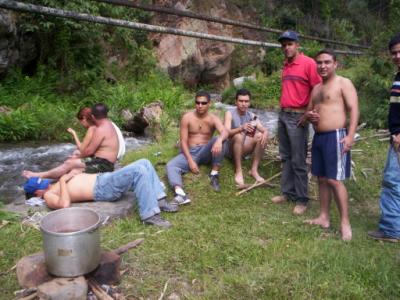
And then, who do you think these guys would rather drink a beer with? Rausseo or Chavez?
That's where this whole thing gets interesting...
Please comment responsibly:
|
The Schemel-Morris-Musipán Axis
...or: method to the madness.As
Condemania grips the nation, the question looms ever larger: who exactly is behind Benjamín Rausseo?
Frankly, I don't know. I do know who's polling for him:
Oscar Schemel, of Hinterlaces, together with the Gringo Prince of Polling Darkness
Dick Morris, the legendarily smarmy, ruthlessly effective DC-operative.
If so, Chavez has something to worry about: Morris is not a man to be messed with, and Oscar Schemel is an extremely savvy pollster in his own right. Schemel has spent years building the case that the only way to beat Chavez is to take a sharp turn away from politics as usual.
Just last week, he was telling
IPS:“The only candidate who can confront Chavez successfully with some sort of margin of success, according to this study, is an ‘outsider,’ someone outside of the current political scheme and who still has not emerged.”
In his opinion, an ample spectrum of the population, up to 49%, can be located in a “ni-ni” (neither-nor) space, since they like neither Chavez nor the opposition. Among the other half of the country, 33% is clearly Chavista and 16% is oppositional.
Schemel said that in his research the population transfers to a hypothetical leader strengths that encapsulate their values, such as that he be young, humble, comes from below and has suffered, that he has a concrete governing program and is not part of any political extremes.
Is this ringing any bells yet?
For years Schemel has been arguing that the Chavez era has produced deep changes in Venezuela's political culture and that the opposition got stuck fighting the last war. Schemel has argued to anyone who will listen that perceptions of the Traditional Opposition political class were so overwhelmingly negative, no challenge from the existing cohort could have a chance against Chavez. His polling bears this out clearly:
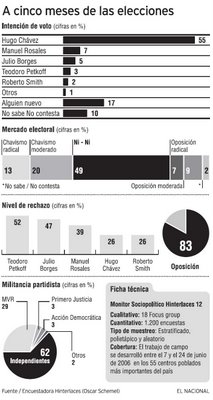 Click to enlarge.
Click to enlarge.And so, for years, Oscar Schemel has been out hunting for an outsider able to take the fight to Chavez in a way no traditional pol possibly could.
Last year
he argued:A new culture is emerging, and it's resignifying and deactivating our received ideas about politics, amidst a social and symbolic struggle to redefine democracy, development and social relations.
The current political struggle is chiefly over interpretations and meanings. While the elites and the middle class fight to impose their own notions about democracy and citizenship, the poor majority, chavista and non-chavista, is refuting and resignifying those same ideas.
While chavismo has an important influence on the new interpretation that arises from this unprecedented political experience of the excluded, it is far from imposing its hegemony as a shared vision able to bring together the different interests of Venezuelan society.
The challenge is to build a new hegemony based on the demands of the majority for reconciliation, unity, equality, efficiency and new leaderships.
Seen in the context of Schemel's longer-term vision, the Conde del Guacharo experiment makes perfect sense. Benjamín Rausseo incarnates all the characteristic of the Perfect Oppo Candidate Schemel's research shows people are looking for:
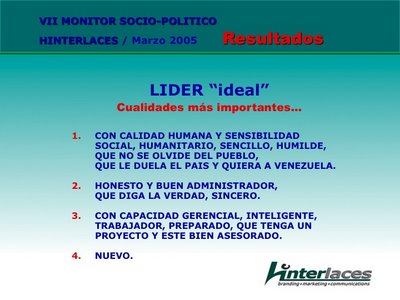 Click to enlarge
Click to enlargeRausseo seems to be Schemel's answer to the question of how to launch a radical symbolic contestation of chavismo that has legs in the population at large. How to fight back effectively at Chavez's attempt to impose a new definition of Democracy in Venezuela.
The perfect outsider to unleash the perfect electoral storm.
Can he pull it off?
Amanecerá y veremos...
Please comment responsibly:
|
Anti-politics taken to its logical conclusion...
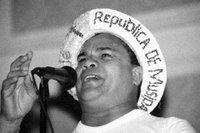
Well, it had to come to this: Benjamín Rausseo, much better known as El Conde del Guacharo, has
launched his presidential bid.It's a bit of a challenge to explain who Mr. Rausseo is to foreign readers. Basically, he's a stand-up comedian who long ago launched a wildly successful, unabashedly ribald act as "El Conde del Guacharo" - a fast talking, obscenity-spewing, tell-it-like-it-is everyman from Oriente. Love his comedy or hate it, Er Conde is just about as far from a traditional politician as it's possible to imagine.
Not surprisingly, the question that dogs Rausseo at this stage is whether he is, you know, actually serious about this. It sure seems like he is: wearing a suit, making a gargantuan effort to contain the stream of utter obscenity that is the cornerstone of his comedy act, and fielding questions (mostly) seriously, he's making every effort to convey that this is not a joke.
Alarmingly, Rausseo seems to be the most talented campaigner the opposition has come up with so far. Making the most of his humble begginings, but also wasting no opportunity to talk about his successful career in business (the guy built and owns a Theme Park in Margarita,) his soon-to-be-earned law degree and his polyglotal abilities, Er Conde is packaging himself as the no-nonsense alternative to Chavez. He's the one opposition guy able to talk to regular Venezuelans in a language they can understand, able to level with them without condescending or patronizing, and able to stake out a dissident position that's solidly grounded in good old, popular common sense. When it comes to connecting with regular people on a gut level, he's just light-years ahead of Borges, Petkoff and Rosales...which is not surprising, since connecting with regular people on a gut level has been his job for 20 years.
Can his candidacy attain the Electoral Tsunami status he aspires to? Only time will tell. For now, I'll just note that his strategic positioning is excellent. Rausseo is selling himself with Roberto Smithesque marketing savvy, but without Smith's hoity-toity East-side-Caracas-via-Harvard baggage. His pitch is solidly centered on Chavez's polling weak points ("se acabó la regaladera de plata! primero los de acá, los demás que se pongan en fila!") and what he lacks in experience he more than makes up in charm, street cred, and
chispa.Other positives? Absolutely everyone knows who El Conde del Guacharo is - and almost everyone seems to like him: he is one candidate with no name-recognition problems, and low negatives. Moreover, he is one guy Chavez just can't run his usual playbook on: Rausseo's outsider aura and popular touch makes him the only candidate with a real chance to out-Chavez-Chavez, to out-feel people's pain, and to out-flank any personal attack. Actually, with his legendary, acerbic wit, trying to attack him would be a distinctly risky proposition for Chavez...who else could bitch-slap the guy the way El Conde could?
Remember how people said Teodoro was a good candidate because Chavez could not credibly dick him around? Well, it turned out that Chavez didn't have to dick him around, because Teodoro is such a hopeless campaigner Chavez can just ignore him. Rausseo, though, is the real thing: a guy who can't be ignored and can't (safely) be attacked.
It's amazing, alarming, depressing, just plain sad that it's come to this, but...I'm sort of excited about it.
[Rausseo's Globovision appearance is
here. His campaign website is
here.]
Please comment responsibly:
|
Housekeeping Note: New Subscription Software

Those of you who've used the "subscribe" thingy to get Caracas Chronicles delivered to your inbox know that the software I was using, Bloglet, was an unreliable piece of junk.
Today, I switched over to
FeedBlitz, which I'm told is substantially better. The formatting on the emailed posts should be much prettier, and the service much more reliable.
Those of you who were already subscribed with the old system don't need to do anything: I already migrated your subscriptions over to the new system. Those of you who weren't subscribed might want to give it a try. Takes two minutes.
Just enter your email, then follow the directions on the screen:
Please comment responsibly:
|
Skypecast: Jonathan DiJohn Casts Doubt on the Resource Curse

In the
second Skypecast in a series on Venezuela's economic collapse, I interview
Jonathan DiJohn. Dr. DiJohn is a lecturer in Political Economy and Development Studies at the University of London, and a former visiting researcher at IESA.
His explanation of Venezuela's economic collapse presents a challenge to the conventional academic wisdom on the subject. Arguing that "resource curse" arguments that highlight the role of oil can't account for Venezuela's growth collapse, Dr. DiJohn focuses instead on the shift to a "Big Push", heavy industry-led development strategy implemented in the 1970s - what we think of as La Gran Venezuela - and argues this type of import-substitution industrialization plan was incompatible with the country's increasingly fragmented and populist political system. Oil, in general, plays a minor role in an explanation that highlights the mismatch between political system and economic strategy starting in 1973.
You can download an early draft of Dr. DiJohn's paper in MS Word format
here.The 40-minute Skypecast is, once again, a non-technical review of his research that I hope will be understandable to non-specialists. I thought the interview was really interesting, but you tell me what you think:
Click here to download the interview.If you like what you hear, you're in luck: Dr. DiJohn will publish a book on the history of Venezuela's Development Strategy next year.
Please comment responsibly:
|
Hugo's Axis of Evil 2006 World Tour: Enough Rope to Hang Himself With
Ah, the harvest of incriminating quotes has begun. Here's Huguito on
Belarus:"I have come here to conclude a unity pact. Here we see a model of the social state that we are beginning to create."
"Here, I've got a new friend and together we'll form a team, a go-ahead team," Chavez said before one-on-one talks. "I thank you, Alexander, for solidarity and we've come here to demonstrate our solidarity."
Lukashenko, an open admirer of the Soviet Union, returned the praise, calling the president of the world's fifth-largest oil exporter "a man of extensive knowledge."
"You are versed not only in the economy of Venezuela but in the Belarus economy, as well. You know military science, the military-industrial complex, and this impresses me very much," he said. "We have many directions for cooperation. There are no closed topics for discussions in our cooperation with Venezuela."
During the 24-hour visit, Chavez was slated to tour a military academy and the "Stalin Line" - a network of World War II-era defense installations restored by Lukashenko's government.
Do note, before retorting some variation on the old "Venezuela can seek diplomatic links with anyone it wants" line, that Chavez is
specifically praising the state model in
Belarus and explicitly noting the similarities between what they have and what he's beginning to create in Venezuela.
First reader to find me a picture of Chavez feeling up Lukashenko good enough to put on the right-hand column wins a lollypop.
Please comment responsibly:
|


leader, who has been on a three- continent tour since last week.
 Ask yourself this: what drives people's voting in the TV age? Is it experience? "Preparation"? A government program? Ideology?
Ask yourself this: what drives people's voting in the TV age? Is it experience? "Preparation"? A government program? Ideology?


 Well, it had to come to this: Benjamín Rausseo, much better known as El Conde del Guacharo, has launched his presidential bid.
Well, it had to come to this: Benjamín Rausseo, much better known as El Conde del Guacharo, has launched his presidential bid. Those of you who've used the "subscribe" thingy to get Caracas Chronicles delivered to your inbox know that the software I was using, Bloglet, was an unreliable piece of junk.
Those of you who've used the "subscribe" thingy to get Caracas Chronicles delivered to your inbox know that the software I was using, Bloglet, was an unreliable piece of junk.  In the second Skypecast in a series on Venezuela's economic collapse, I interview Jonathan DiJohn. Dr. DiJohn is a lecturer in Political Economy and Development Studies at the University of London, and a former visiting researcher at IESA.
In the second Skypecast in a series on Venezuela's economic collapse, I interview Jonathan DiJohn. Dr. DiJohn is a lecturer in Political Economy and Development Studies at the University of London, and a former visiting researcher at IESA. 